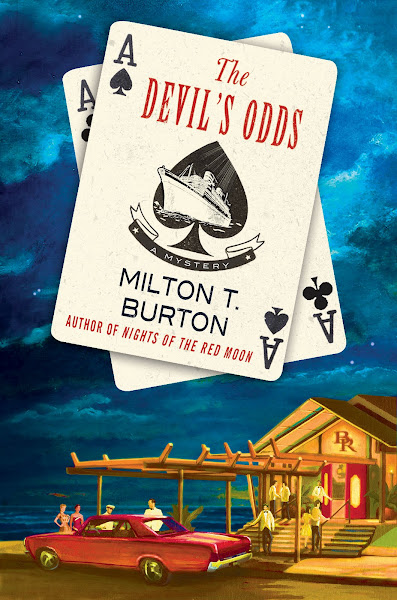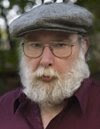
If that title didn't get your attention, I don't know what would. But Shakespeare was, in many respects, a pulp writer, and he was, in most respects, a commercial writer.
He wrote to make money. Which goes hand-in-glove with a point I want to make.
The facts of Shakespeare's life are too readily available to repeat them here. Suffice to say that he was a professional actor who owned part of a theater company that operated in a very competitive environment. Apparently he thought that he could do better than the plays commercially available, and about 1590 he began
to write. And make no mistake: all his plays were written for a popular audience. Not only that, he often padded his texts to increase their length. London theater audiences were very volatile, and could riot and damage a theater if they did not think they were getting their money's worth. To this end, Shakespeare included plenty of bawdy comedy, outlandish fight scenes, grotesque puns, obscene
buffooneries, spilled blood and limitless gore--in short, all the
Ramboesque departures from "good taste" the movies are accused of today.
My point being that the greatest writer in the English language was very much a part of the entertainment industry and that he wrote for a popular audience. And he was subject to much of the same same sort of derisive criticism one hears of Hollywood in modern times. In Shakespeare's day, snobbish young
Oxbridge pecksniffs used to come out to the London theaters to laugh at how the "ignorant" playwrights of the era violated the dramatic "unities." Why, everyone knew that the action of a tragedy had to take place in the space of a single day! The great Aristotle had said so! I'm sure Shakespeare was laughing all the way to the bank. He invested wisely and retired wealthy, and along the way gave us some of the greatest poetry ever to grace our language.
These days, in this country at least, there exists a vast divide between those books that are considered literary fiction and those that are dismissed as "popular" entertainment. This was not always the case. At least up through the early 1960s, our best literary writers had a wide audience and it was not uncommon for books by Hemingway, Faulkner, and Steinbeck to be found on the bestseller lists.
This began to change in the 1960s. I believe part of the reason for this was the vast influx of the Boomer generation into colleges. Prior to this time, a writer had to cultivate a fairly wide readership in order to make any money or get any recognition. With the rapid growth in the size of college classes, and with state universities quadrupling their enrolments in this decade, it became possible for a writer to have a captive audience of students who were required to buy his books merely by pitching his work to the academic critics who determined what was read in college courses.
Then there was the rising popularity of the
avant garde with popular, wide circulation magazines like
Atlantic Monthly and
The New Yorker in which such pretentious frauds as Susan Sontag whooped it up for
inaccessible writers like William Burroughs, Antonin
Artaud, and Andre
Robbe Grillet. The obscure became the darling plaything of the so-called literary intelligentsia while storytelling fell by the wayside as archaic and vulgar hangovers from an earlier and less enlightened era. Along about the same time and for reasons I can't begin to understand, some of our best writers turned their talents away from fiction and moved toward what can only be called impressionistic journalism. An example of this is Truman Capote. One of the last books by a major literary writer that I can recall that achieved blockbuster status was his
In Cold Blood, a novel-like account of a brutal quadruple Kansas murder and its aftermath that was greeted as a "non-fiction novel." Capote himself hyped this work as a new type of reportage, which he, with characteristic pomposity, pronounced in the French fashion as "
rey-
por-
tage." Since the death of the author, who was a
pathological liar of the first water, it has come to light that several of the key scenes and conversations he recounted in his published narrative never occurred. In short, Capote left us with a sort of literary
morphodite that is neither true crime nor truly fiction. It is, however, a thrilling and brilliant account that is well worth reading, whatever it is. But
In Cold Blood was the beginning of a trend followed by many of our other best writers, including Norman Mailer (
The Executioner's Song, Oswald's Tale) and Don
DeLillo (
Falling Man, Libra), in which the authors wrote fiction-like accounts of true events in a way that blended the subjectivity of literature with the objectivity of newspaper reporting. This has, in my opinion, been a destructive trend in many ways for much fine talent has been wasted in areas where it should not have been spent.
Then came literary critics like Derrida,
Foucalt,
le Man and others, and with them came the critical schools of postmodernism, deconstructionism, textual analysis, and on and on. These preposterous oafs all sought, in one way or another, to prove that (A.) nothing means anything in literature & (B.) all past literary efforts had been the tools of oppression directed toward the downtrodden of the world. Yes. that's right, friends and neighbors: Shakespeare/Faulkner/Hemingway/Cather/
et al. weren't writing to entrance and entertain; they were writing to oppress women, blacks, gays, Muslims, Moors, lesbians, Amerindians, Africans, Tasmanians,
Blogdovians,
Wachovians,
Malmutes,
Tasmutes,
Transmutes, Piutes,
Flems,
Waloons, and bridge players--just take your pick from a bulging, K-Mart grab-bag of late 20
th century trendy
victimology. It seems strange to me that people drawn to the study of literature would spend their lives trashing the very writers one would think they should love. But taking human nature into account, I suppose it is no great wonder that we enjoy a surplus of the bright-eyed and ambitious who would eagerly
fellatiate a baboon in Macy's window if it would earn them a little attention or help them build a career. Such is the state of utter
whoredom one finds in the world of contemporary literary studies.
So is literature dead? Far from it, according to several college English teachers of my
acquaintance. However, they tell me that the truly vital work these days is to be found in genre literature---crime novels, science fiction, erotic romance, etc., and they expect a rebirth of true quality any day now. So in the interregnum, get yourself some James Lee Burke, Robert A. Heinlein, or Melinda M.
Snodgrass. Meanwhile, for those of you who can afford the airfare,
Hamlet is playing this spring at the restored Globe Theater in London---as it still is here and there all over the world.
 If you haven't read James Lee Burke but have an interest in mystery & crime fiction, you have one of the more pleasurable experiences in contemporary literature waiting for you.
If you haven't read James Lee Burke but have an interest in mystery & crime fiction, you have one of the more pleasurable experiences in contemporary literature waiting for you.





